QuestionQUESTION: Hi, I have a rattiegirl named Molly who is AT LEAST 2 and a half, but we don't know her actual age. She is a little plump but otherwise in good health. Last year, she got sick and stopped eating and her underside was covered in urine and diarrhea, and I also noticed that around her urethra was a little swollen. She stayed at the vet for about a week and they gave her antibiotics and sub q fluids and she came home fine, except that odd swelling didn't go away. It looked like she had testicles. My vet said it looked just like some fatty deposits, so I brought her to another vet for a second opinion, and they said again, it just looks like some fatty pouches. It feels nothing like a mammary tumor (though I know they can all be different) and it doesn't look like a mammary tumor, it looks like she is an un-neutered male rat (though I know she is a girl because she has a vagina.) So, I was wondering if it's something that I should have removed and I brought her to another vet for a 3rd opinion. She's had this fatty thing for about 5 months now, and it might be growing very slowly. The vet I brought her to today said it's not mammary tumors, it's fatty tumors, and he doesn't want to operate because it's in the perianeal area and he is worried of the damage that it could potentially cause, and since it's just fat it's not going to grow like a mammary tumor. Now, I haven't heard of these fatty tumors. Do they exist, or is it just a soft mammary tumor? My first thought was that maybe it's her ovaries or something that are swollen, but all 3 vets have said that's not the case. Have you seen anything like this? I know they can get tumors anywhere at all on their bodies.
ANSWER:
Has any of these Vets suggested to aspirate these alleged fatty tumors and have a histopathological examination of the contents of the tissue studied? That would be the first thing I would do in order to determine what is REALLY going on rather than guess by simple palpation. It may cost a bit more but it would have been more cost effective to do this in the first place rather than pay for three different Vet exams.
That said, what I can tell you is that yes, there is such a thing as a fatty tumor found on rats. It is known as a "lipoma" and are slow growing, benign fatty tumors that are usually harmless since they are not known to spread. However, we highly recommend a needle aspiration along with a histological exam periodically just to check for any changes once it has been determined it is indeed a lipoma from the first biopsy. Checking on the lipoma (s) over time is to rule out any malignant changes, such as a liposarcoma that could occur. Also keep in mind that although it is stated these are generally harmless, if they do continue to grow, even at a slow pace, they can involve blood /bone marrow and or connective tissue. They may also cause irritation when the rat moves and can decrease the rats mobility if they become to large or get in the way of the rats limbs. This is when they do need removed. Surgery is generally easy since lipomas are usually subcutaneous, simply laying right under the skin, and usually do not become vascular so there is little risk of serious bleeding.
My opinion at this time would be to have a needle aspiration and biopsy done just to be sure it is indeed a lipoma.
Being she is on the chubby side and if these lumps have grown that slow over a five month period, I would probably suggest lipoma as well (the nodules are soft and easily movable)
and if they were mammary tumors they would no doubt be huge by now (usually)
My question to you is this: If they were mammary tumors, would you want to remove them? If the answer is NO, I would not really even bother putting her through a needle asipration. She may not like it too much and if you do not plan to remove them no matter what they are, why bother going through all of that? Although she is not extremely old, I am not sure how healthy she is and at her age I dont know if it would be worth the risk. I usually am gung ho on surgery but if they are lipomas, I would not risk anesthesia for that. Just my opinion however.
Hope this helps. Please keep me posted!
---------- FOLLOW-UP ----------
QUESTION: Well here's the thing. I had one rat who had a tumor and my vet aspirated some cells and said they were cancerous. I brought him to Tufts for a second opinion, and the dr there said never to do a needle aspiration to check tumors, because they are rarely accurate. All the vets I have ever been to have said needle aspirations are fine, but that one big fancy dr at Tufts said no. I always have all my rats' tumors removed as soon as I find one, but with Molly I was concerned because of the location of the tumor, being in an odd place where it will get urine and most likely feces on it. I'm a little wary of the needle aspiration after what I went through with that rat that the dr told me needle aspirations aren't accurate.
What I'm probably going to do for now is just keep a close eye on her. If there seems to be any problem or they seem to be getting a lot bigger, I'll probably do the needle aspiration. As I type this she is bruxing and doing googly eyes in my husband's hands, so at least she's happy for now!
Thanks so much for getting back to me, and I will keep you posted!
AnswerThats a new one on me that an actual histology done by a certified pathologist would be inaccurate. Usually this is done by the same people that study tissues extracted during a necropsy, not by the vet just looking under a $200 microscope and guessing what he sees in the contents from the needle. I can see those not being as accurate, since after all, the vet went to vet school to become a vet, not to be a pathologist. Also, there could easily be a mistake in suggesting that the tumor is cancerous when it could easily be encapsulated, so there is no way to know if it could spread or not simply by studying the fluid taken. Maybe the vet at Tufts doesnt think aspiration of the contents of the mass and studied right at the clinic by the vet and his staff is accurate....but to say a certified pathologist would be inaccurate is like saying they are not doing their job properly because this is what they do, all day long, is study tissue and all that happy stuff.
However, I agree with leaving her be for now anyhow. If she is happy and doing her thing, I would let her enjoy her senior years.

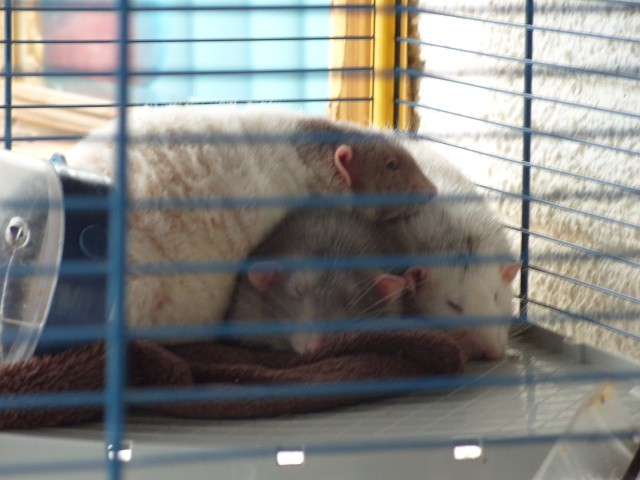 Follow up on Gonzo
QuestionQUESTION: Hi Sandra,
I just thought I should l
Follow up on Gonzo
QuestionQUESTION: Hi Sandra,
I just thought I should l
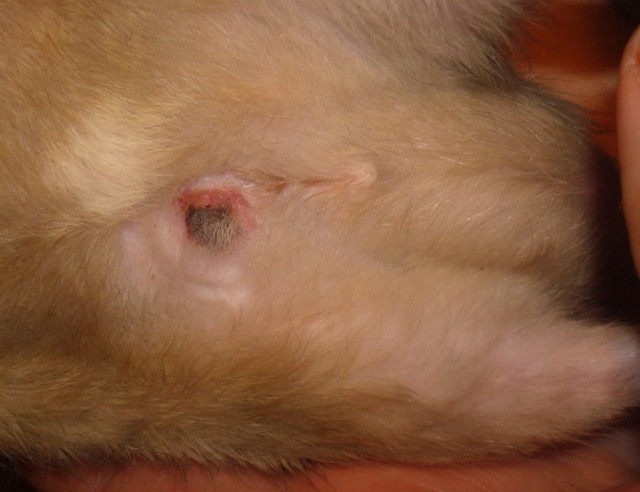 Follow up to Cyst On Rat, Surgery Advice?
QuestionRileys lump
QUESTION: Hi Sandra!
I have
Follow up to Cyst On Rat, Surgery Advice?
QuestionRileys lump
QUESTION: Hi Sandra!
I have
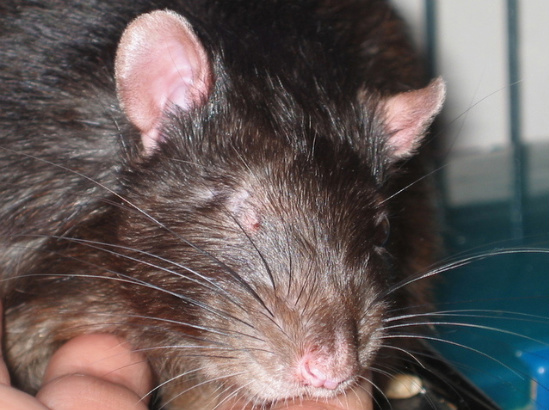 How do I help my rat to heal her eye infection?
QuestionQUESTION: About a month ago I took to my rat to
How do I help my rat to heal her eye infection?
QuestionQUESTION: About a month ago I took to my rat to
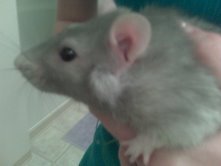 Tumor or abscess, what should i do?
Questionpicture of my rat, ol
QUESTION: I have
Tumor or abscess, what should i do?
Questionpicture of my rat, ol
QUESTION: I have
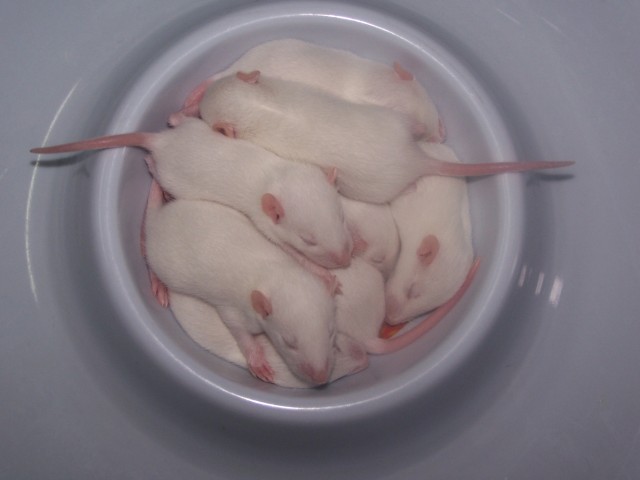 thermal reaction of albino rats
Question
naughty kidz
hello!!
i have 12 albino rats...
thermal reaction of albino rats
Question
naughty kidz
hello!!
i have 12 albino rats...